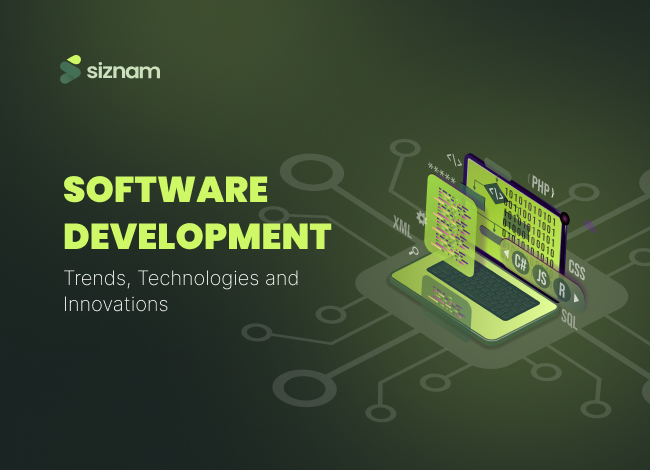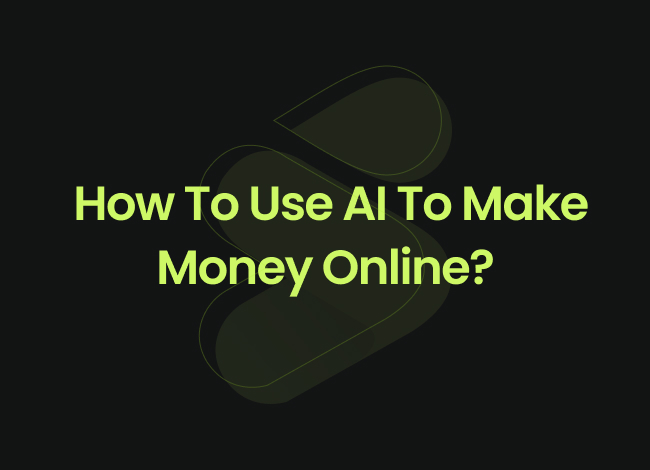Introduction
Over the years, the technology has advanced at an exponential rate, hence giving rise to other reliable and new forms of technology like blockchain, artificial intelligence, and several others. Amongst them all, software development technologies have proven themselves to be the real game changers. In this blog post, we will discuss software development trends, technologies, and other innovations.
Trends in Software Development
Advancements in technology have produced new trends in software development that are more advanced and more reliable. These latest trends have been instrumental in the future of software development, making it fast, efficient, dependable, and cost-effective. Here are some famous trends in software development:
Cloud-Native Development and Serverless Architecture
The main trend that has greatly impacted the future of software development is cloud-native development and serverless architecture, which allows for easier management of the software through cloud environments. Serverless architecture particularly allows developers to focus on code without worrying about infrastructure.
Decentralised Applications (DApps) and Blockchain Technology
Decentralised applications and blockchain technology is a significant trend that has transformed our understanding and perspectives regarding software development. Blockchains have transformed the software development future by introducing decentralisation, transparency, and security. Platforms like Hyperledger or Ethereum are usually used by Developers to build decentralised applications.
Internet of Things (IoT) and Connected Devices
Internet of Things (IoT) devices are also known as connected devices, while edge computing is one of the latest emerging technologies among other recent popular programming languages used by developers due to its various capabilities, some being increased speed just close to desktop apps. It has brought about changes that impact related tech, such as smart homes/devices/industrial sensor technologies, with the industrial sector encompassing industrial automation. Among other data applications, using IoT program that helps them gain insights from their data’s almost real-time availability leads to automated systems predicting when particular machine parts would fail so they could be replaced before they broke down where possible.
Artificial Intelligence (AI) and Machine Learning (ML)
Artificial intelligence (AI) or machine learning (ML) is used in software development. Both of these trends have changed the way software is developed by making it faster and smarter. Developers can create smart systems that can learn from data, predict what will happen, and adjust to users’ actions using AI (artificial intelligence) and ML (machine learning). From virtual assistants to predictive analytics, AI-powered software is transforming industries ranging from healthcare to finance.
Progressive Web Applications (PWAs) and Cross-Platform Development
The latest technologies have come up with new kinds of problems for all of them. With different specifications on mobile phones and other devices, such as screen sizes, developers are now moving towards the newest progressive web applications as well as cross-platform development frameworks. Progressive web applications combine the reach of the web with the performance of native apps; React Native, Flutter, and Xamarin are frameworks that allow developers to build cross-platform apps quickly, reducing time-to-market.
Latest Software Technology
Software technology trends move the IT industry and software development at a fast pace. By adopting the latest technologies for software development, these technologies make it more efficient and effectively streamlined, thus improving software development processes. Some of these latest technology include:
Deep Learning and Neural Networks
Software development technologies such as deep learning and neural networks are very crucial due to their algorithms and neural networking. These algorithms and neural networks are artificial intelligence-driven applications that have the capability of performing functions like image recognition, natural language processing, or even autonomous decision-making. All these processes make the software development process easy and efficient.
Serverless Computing and Function as a Service
Another critical area in software development is serverless computing, which functions as a service. Both of them play an extremely significant role in making the software development process fast while preserving its reliability. Serverless computing platforms such as AWS Lambda or Google Cloud Functions abstract infrastructure management away from developers who get more space for code writing without having to worry about servers’ provisioning.
Blockchain Platforms and Smart Contracts
Platforms such as Ethereum and Binance Smart Chain provide decentralized applications (DApps) with tamper-proof data storage facilities and self-executing smart contracts. Blockchain platforms and smart contracts, using their cutting-edge technologies, have changed the way in which software is developed, offering peer-to-peer transactions, smart contracts, and tamper-proof data storage.
Edge Computing and IoT Gateways
Cutting-edge technologies in edge computing combined with IoT gateways merge the devices with the technology itself. Computing platforms such as AWS IoT Greengrass or Azure IoT Edge enable real-time data processing at network edges closer to IOT devices/sensors.
Cross-Platforms Development Frameworks
Frameworks like Flutter, React Native, and Xamarin allow developers to design cross-platform apps with just one codebase, thus reducing development time. They take the web reach of cross-platform development frameworks but combine them with the performance characteristics of native apps, which results in less time to market and streamlines the development process itself.
Advanced Innovations in Software Development
As quickly as products themselves appeared on the market, so many breakthroughs took place in the field of software development. It has changed how this software works in markets today, making it not only super functional but also very low-cost due to the introduction of innovations in software engineering. Here are some great examples of software innovation:
Generative Pre-trained Transformer (GPT) Models:
Out of all the latest developments in software, GPT is a well-known one. It revolutionized natural language processing and text generation in software development as this technology brought new meaning to the world of software development. Advanced models like GPT-3 understand and generate human-like text that powers chatbots, content generation, and language translation. These conversational AI technologies use GPT models to enable them to have intelligent conversations with people by improving their efficiency.
Kubernetes Operators and Declarative Configuration Management:
The next big thing in software advancement is Kubernetes operators and declarative configuration management. Such operators have made the process of developing software faster and more effective. Unlike before, Kubernetes operators and declarative configuration management have entirely changed how software gets deployed or managed on distributed systems. Operators extend Kubernetes capabilities to automate complex tasks such as application lifecycle management and scaling, for example. In contrast, declarative configuration management brings about consistency across deployment pipelines, thereby enabling teams to streamline deployment workflows and improve operational efficiency.
Zero-Trust Architectures and Homomorphic Encryption:
In future software engineering, it is evident that the latest developments in the field are promising and profitable. These trends, such as Artificial Intelligence (AI) and Machine Learning (ML), Cloud-Native Development and Serverless Architecture, Decentralized Applications (DApps) and Blockchain Technology, Internet of Things (IoT) and Connected Devices, and Progressive Web Applications (PWAs) and Cross-Platform Development have changed the very concept of software. Moreover, other technologies and innovations are now being emphasized to make development more accessible and efficient. So, be sure to apply best practices when developing reliable software.
Chaos Engineering and Progressive Delivery:
Of all the ground-breaking software solutions, chaos engineering and progressive delivery practices have shaped the way software development is done most positively. These processes of chaotic engineering and progressive delivery are spurring innovations in software reliability as well as deployment methodologies. Chaos engineering entails introducing flaws into computer programs with the goal of identifying weaknesses and making them more robust. Teams can employ progressive delivery techniques to pull out new versions of their software slowly, which reduces risk and maximizes user satisfaction. They thus contribute both to better resilience and reliability for developers, as well as user-oriented tools.
WebAssembly (Wasm) and GPU Acceleration:
No other technological invention within this business has had such a profound effect on the development community as WebAssembly (Wasm) along with GPU acceleration; they have made the algorithm implementation process incredibly fast and easy. These advancements in WebAssembly (Wasm) and GPU acceleration are empowering web applications to perform high-performance computations directly inside browsers. Wasm provides the ability to run complex algorithms and applications at speeds close to native ones, thereby increasing the opportunities for web-based software products. Additionally, GPU acceleration activates the parallelization capacity found in Graphics Processing Units (GPUs). In this case, it acts on computationally intensive areas like machine learning inference or data analytics for visualising information using web services. All these things push forward web development to create richer content on the internet.
Conclusion
Accordingly, future software engineering appears highly promising and profitable due to emerging trends in technology that are occurring right now across various fields connected with it. Things like Artificial Intelligence (AI) & Machine Learning (ML), Cloud-Native Development & Serverless Architecture, Blockchain Technology & Decentralised Applications (DApps), Internet of Things (IoT) & Connected Devices or Progressive Web Applications (PWAs) & Cross-Platform Development bring revolution into understanding what software is about today. Nowadays, many other technologies and innovations are concentrated on, which helps develop the system even more efficiently and quickly. That is why it would be better to choose the best software practices, which will make the development process foolproof.






